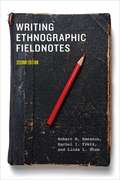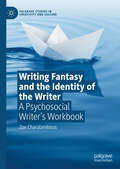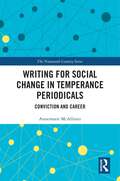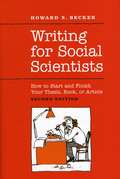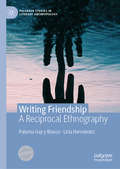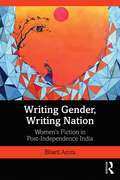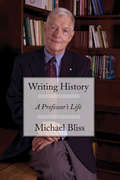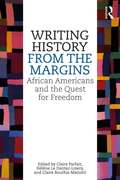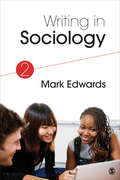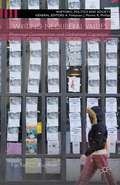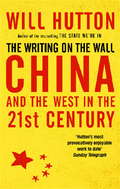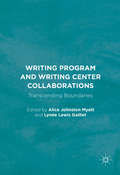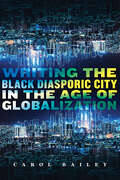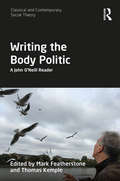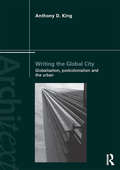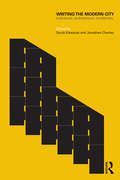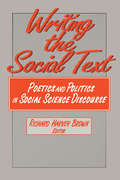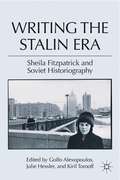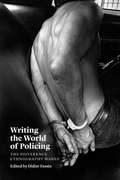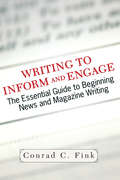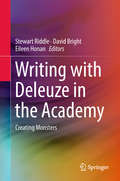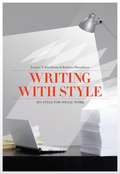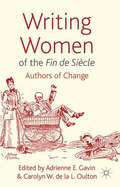- Table View
- List View
Writing Ethnographic Fieldnotes
by Robert M. Emerson Rachel I. Fretz Linda L. ShawIn "Writing Ethnographic Fieldnotes, "Robert M. Emerson, Rachel I. Fretz, and Linda L. Shaw present a series of guidelines, suggestions, and practical advice for creating useful fieldnotes in a variety of settings, demystifying a process that is often assumed to be intuitive and impossible to teach. Using actual unfinished notes as examples, the authors illustrate options for composing, reviewing, and working fieldnotes into finished texts. They discuss different organizational and descriptive strategies and show how transforming direct observations into vivid descriptions results not simply from good memory but from learning to envision scenes as written. A good ethnographer, they demonstrate, must learn to remember dialogue and movement like an actor, to see colors and shapes like a painter, and to sense moods and rhythms like a poet. This new edition reflects the extensive feedback the authors have received from students and instructors since the first edition was published in 1995. As a result, they have updated the race, class, and gender section, created new sections on coding programs and revising first drafts, and provided new examples of working notes.
Writing Fantasy and the Identity of the Writer: A Psychosocial Writer’s Workbook (Palgrave Studies in Creativity and Culture)
by Zoe CharalambousThis book presents the innovative pedagogy of Writing Fantasy: a method for exploring and shifting one’s identity as a writer. The book draws on qualitative research with undergraduate creative writing students and fills a gap in the literature exploring creative writing pedagogy and creative writing exercises. Based on the potential to shift writer identity through creative writing exercises and the common ground that these share with the stance of the Lacanian analyst, the author provides a set of guidelines, exercises and case studies to trace writing fantasy, evidenced in one’s creative writing texts and responses about creative writing. This innovative work offers fresh insights for scholars of creativity, Lacan and psychosocial studies, and a valuable new resource for students and teachers of creative writing.
Writing for Social Change in Temperance Periodicals: Conviction and Career (The Nineteenth Century Series)
by Annemarie McAllisterThis book suggests alternative ways of looking at what made a writer, what people gained from writing, and explores the alternative world of temperance periodicals of the nineteenth and early twentieth century. It introduces some of the now-forgotten writers who, in their thousands, kept the Victorian periodical presses rolling, and the public entertained. Locating their writing in the context of their personal commitment, the study takes seven prolific writers who were outside what we now think of as the circuits of conventional publication and authorship, and looks at how they found ways to make their voices heard. Their absorption in a cause led them to forge impressive writing careers in a variety of genres and media, focusing around high-circulation temperance periodicals. Examining their cultural contributions as well as their professional lives confirms the importance of the temperance movement in the second half of the nineteenth century, and raises questions about distribution practices and values, and distinctions between ‘life’ and ‘work.’
Writing for Social Scientists: How to Start and Finish Your Thesis, Book, or Article
by Howard Saul Becker Pamela RichardsStudents and researchers all write under pressure, and those pressures -- most lamentably, the desire to impress your audience rather than to communicate with them -- often lead to pretentious prose, academic posturing, and, not infrequently, writer's block. Sociologist Howard S. Becker has written the classic book on how to conquer these pressures and simply write. First published nearly twenty years ago, "Writing for Social Scientists" has become a lifesaver for writers in all fields, from beginning students to published authors. Becker's message is clear: in order to learn how to write, take a deep breath and then begin writing. Revise. Repeat. It is not always an easy process, as Becker wryly relates. Decades of teaching, researching, and writing have given him plenty of material, and Becker neatly exposes the foibles of academia and its "publish or perish" atmosphere. Wordiness, the passive voice, inserting a "the way in which" when a simple "how" will do -- all these mechanisms are a part of the social structure of academic writing. By shrugging off such impediments -- or at the very least, putting them aside for a few hours -- we can reform our work habits and start writing lucidly without worrying about grades, peer approval. In this new edition, Becker takes account of major changes in the computer tools available to writers today, and also substantially expands his analysis of how academic institutions create problems for them. As competition in academia grows increasingly heated, "Writing for Social Scientists" will provide solace to a new generation of frazzled, would-be writers.
Writing Friendship: A Reciprocal Ethnography (Palgrave Studies in Literary Anthropology)
by Paloma Gay y Blasco Liria HernándezThis book tells the remarkable story of the friendship between Liria Hernández, a Roma woman from Madrid, and Paloma Gay y Blasco, a non-Roma anthropologist. In this unique reciprocal experiment, the former informant returns the gaze to write about the anthropologist, her life and her environment. Through finely crafted and deeply moving text, Hernández and Gay y Blasco suggest new ways of doing and writing anthropology. The dialogue between Hernández and Gay y Blasco provides a courageous account of the entanglements and rewards of anthropological research. Drawing on letters, conversations, and fieldnotes gathered over twenty-five years, each of the authors talks about herself, the other, and the impact of anthropology on their two lives. They examine their intertwined trajectories as Spanish women and reflect on the challenges of devising their own reciprocal genre. Blending ethnography, life story and memoir, they undermine the dichotomy between author and subject around which scholarship still revolves.
Writing Gender, Writing Nation: Women’s Fiction in Post-Independence India
by Bharti AroraThis book explores the gendered contexts of the Indian nation through a rigorous analysis of selected women’s fiction ranging from diverse linguistic, geographical, caste, class, and regional contexts. Indian women’s writing across languages, texts, and contexts constitutes a unique narrative of the post-independence nation. This volume highlights the ways in which women writers negotiate the patriarchal biases embedded in the epistemological and institutional structures of the post-independence nation-state. It discusses works of famous Indian authors like Amrita Pritam, Jyotirmoyee Devi, Mannu Bhandari, Mahasweta Devi, Mridula Garg, Nayantara Sahgal, Indira Goswami, and Alka Saraogi, to name a few, and facilitates a pan-Indian understanding of the concerns taken up by these women writers. In doing so, it shows how ideas travel across regions and contribute towards building a thematic critique of the oppressive structures that breed the unequal relations between the margins and the centre. The volume will be of interest to scholars and researchers of gender studies, women’s studies, South Asian literature, political sociology, and political studies.
Writing History: A Professor’s Life
by Michael BlissOne of Canada’s best-known and most-honoured biographers turns to the raw material of his own life in Writing History. A university professor, prolific scholar, public intellectual, and frank critic of the world he has known, Michael Bliss draws on extensive personal diaries to describe a life that has taken him from small-town Ontario in the 1950s to international recognition for his books in Canadian and medical history. His memoir ranges remarkably widely: it encompasses social history, family tragedy, a critical insider’s view of university life, Canadian national politics, and, above all, a rare glimpse into the craftsmanship that goes into the research and writing of history in our time. Whether writing about pigs and millionaires, the discovery of insulin, sleazy Canadian politicians, or the founders of modern medicine and brain surgery, Michael Bliss is noted for the clarity of his prose, the honesty of his opinions, and the breadth of his literary interests.
Writing History from the Margins: African Americans and the Quest for Freedom
by Claire Parfait Hélène Le Dantec-Lowry Claire Bourhis-MariottiWith contributions from leading American and European scholars, this collection of original essays surveys the actors and the modes of writing history from the "margins" of society, focusing specifically on African Americans. Nearly 100 years after The Journal of Negro History was founded, this book assesses the legacy of the African American historians, mostly amateur historians initially, who wrote the history of their community between the 1830s and World War II. Subsequently, the growth of the civil rights movement further changed historical paradigms--and the place of African Americans and that of black writers in publishing and in the historical profession. Through slavery and segregation, self-educated and formally educated Blacks wrote works of history, often in order to inscribe African Americans within the main historical narrative of the nation, with a two-fold objective: to make African Americans proud of their past and to enable them to fight against white prejudice. Over the past decade, historians have turned to the study of these pioneers, but a number of issues remain to be considered. This anthology will contribute to answering several key questions concerning who published these books, and how were they distributed, read, and received. Little has been written concerning what they reveal about the construction of professional history in the nineteenth century when examined in relation to other writings by Euro-Americans working in an academic setting or as independent researchers.
Writing in Sociology
by Mark Evan EdwardsWith humor and empathy, Mark Edwards’s handbook provides undergraduate and early-career graduate students guidance in sociological writing of all kinds. Writing in Sociology offers unusual approaches to developing ideas into research questions, utilizing research literature, constructing research papers, and completing different kinds of course writing (including case studies, theory papers, and applied social science projects). New chapters in the Second Edition offer insights into giving and receiving effective peer review and presenting qualitative research results. By focusing on how to think about the goals and strategies implicit in each section of a writing project this book provides accessible advice to novice sociological writers.
Writing in Sociology
by Mark Evan EdwardsWith humor and empathy, Mark Edwards’s handbook provides undergraduate and early-career graduate students guidance in sociological writing of all kinds. Writing in Sociology offers unusual approaches to developing ideas into research questions, utilizing research literature, constructing research papers, and completing different kinds of course writing (including case studies, theory papers, and applied social science projects). New chapters in the Second Edition offer insights into giving and receiving effective peer review and presenting qualitative research results. By focusing on how to think about the goals and strategies implicit in each section of a writing project this book provides accessible advice to novice sociological writers.
Writing Neoliberal Values: Rhetorical Connectivities and Globalized Capitalism (Rhetoric, Politics and Society)
by Rachel C. RiednerThis book examines human-interest stories, unpacking from them violence inherent to neoliberalism, and considers if it is possible to find in these stories hints of people and labour that suggest other narratives.
The Writing On The Wall: China And The West In The 21st Century
by Will HuttonChina constitutes a fifth of the world's population. Over the last twenty years its economy has doubled to make it the fifth largest economy in the world; if the pace is repeated over the next twenty it is set to become second only to the US. The speed of its development is stunning, a combination of cheap labour and commitment to science and technology that has never been matched by a developing country. The Pearl River Delta, Shanghai and Beijing have become city-regions whose growth and embrace of modernity strike the visitor with awesome force. This is a continent on the move, recovering the world position and wealth it once had.The re-emergence of China as a superpower constitutes the biggest challenge the world has had for more than a century. Never before in modern times has the financial, trade, economic and diplomatic world pecking order been so profoundly reconstituted with the challenger country itself in the grips of incredible ideological and political change. This is a transition both internally in China and externally in the world beyond beset by hazard and risk. The world's peace and prosperity depends upon it being executed successfully.
The Writing On The Wall: China And The West In The 21St Century
by Will HuttonChina constitutes a fifth of the world's population. Over the last twenty years its economy has doubled to make it the fifth largest economy in the world; if the pace is repeated over the next twenty it is set to become second only to the US. The speed of its development is stunning, a combination of cheap labour and commitment to science and technology that has never been matched by a developing country. The Pearl River Delta, Shanghai and Beijing have become city-regions whose growth and embrace of modernity strike the visitor with awesome force. This is a continent on the move, recovering the world position and wealth it once had.The re-emergence of China as a superpower constitutes the biggest challenge the world has had for more than a century. Never before in modern times has the financial, trade, economic and diplomatic world pecking order been so profoundly reconstituted with the challenger country itself in the grips of incredible ideological and political change. This is a transition both internally in China and externally in the world beyond beset by hazard and risk. The world's peace and prosperity depends upon it being executed successfully.
Writing Program and Writing Center Collaborations
by Alice Johnston Myatt Lynée Lewis GailletThis book demonstrates how to develop and engage in successful academic collaborations that are both practical and sustainable across campuses and within local communities. Authored by experienced writing program administrators, this edited collection includes a wide range of information addressing collaborative partnerships and projects, theoretical explorations of collaborative praxis, and strategies for sustaining collaborative initiatives. Contributors offer case studies of writing program collaborations and honestly address both the challenges of academic collaboration and the hallmarks of successful partnerships.
Writing the Black Diasporic City in the Age of Globalization
by Carol BaileyWriting the Black Diasporic City in the Age of Globalization theorizes the city as a generative, “semicircular” social space, where the changes of globalization are most profoundly experienced. The fictive accounts analyzed here configure cities as spaces where movement is simultaneously restrictive and liberating, and where life prospects are at once promising and daunting. In their depictions of the urban experiences of peoples of African descent, writers and other creative artists offer a complex set of renditions of twentieth- and twenty-first-century Black urban citizens’ experience in European or Euro-dominated cities such as Boston, London, New York, and Toronto, as well as Global South cities such as Accra, Kingston, and Lagos—that emerged out of colonial domination, and which have emerged as hubs of current globalization. Writing the Black Diasporic City draws on critical tools of classical postcolonial studies as well as those of globalization studies to read works by Ama Ata Aidoo, Amma Darko, Marlon James, Cecil Foster, Zadie Smith, Michael Thomas, Chika Unigwe, and other contemporary writers. The book also engages the television series Call the Midwife, the Canada carnival celebration Caribana, and the film series Small Axe to show how cities are characterized as open, complicated spaces that are constantly shifting. Cities collapse boundaries, allowing for both haunting and healing, and they can sever the connection from kin and community, or create new connections.
Writing the Body Politic: A John O’Neill Reader (Classical and Contemporary Social Theory)
by Mark Featherstone Thomas KempleThis book brings together key essays from the career of social theorist John O’Neill, including his uncollected later writings, focusing on embodiment to explore the different ways in which the body trope informs visions of familial, economic, personal, and communal life. Beginning with an exploration of O’Neill’s work on the construction of the biobody and the ways in which corporeality is sutured into social systems through regimes of power and familial socialisation, the book then moves to concentrate on O’Neill’s career-long studies of the productive body and the ways in which the working body is caught in and resists disciplinary systems that seek to rationalise natural functions and control social relations. The third section considers O’Neill’s concern with the ancient, early modern, and psychoanalytic sources of the post-modern libidinal body, and a final section on the civic body focuses specifically on the ways in which principles of reciprocity and generosity exceed the capitalist, individualist body of (neo)liberal political theory. The volume also includes an interview with O’Neill addressing many of the key themes of his work, a biographical note with an autobiographical postscript, a select bibliography of O’Neill’s many publications, and an extensive introduction by the editors. A challenging and innovative collection, Writing the Body Politic: A John O’Neill Reader will appeal to critical social theorists and sociologists with interests in the work of one of sociology’s great critical readers of classical and contemporary texts.
Writing the Global City: Globalisation, Postcolonialism and the Urban (Architext)
by Anthony D KingOver the last three decades, our understanding of the city worldwide has been revolutionized by three innovative theoretical concepts – globalisation, postcolonialism and a radically contested notion of modernity. The idea and even the reality of the city has been extended out of the state and nation and re-positioned in the larger global world. In this book Anthony King brings together key essays written over this period, much of it dominated by debates about the world or global city. Challenging assumptions and silences behind these debates, King provides largely ignored historical and cultural dimensions to the understanding of world city formation as well as decline. Interdisciplinary and comparative, the essays address new ways of framing contemporary themes: the imperial and colonial origin of contemporary world and global cities, actually existing postcolonialisms, claims about urban and cultural homogenisation and the role of architecture and built environment in that process. Also addressed are arguments about indigenous and exogenous perspectives, Eurocentricism, ways of framing vernacular architecture, and the global historical sociology of building types. Wide-ranging and accessible, Writing the Global City provides essential historical contexts and theoretical frameworks for understanding contemporary urban and architectural debates. Extensive bibliographies will make it essential for teaching, reference and research.
Writing the Modern City: Literature, Architecture, Modernity
by Sarah Edwards Jonathan CharleyLiterary texts and buildings have always represented space, narrated cultural and political values, and functioned as sites of personal and collective identity. In the twentieth century, new forms of narrative have represented cultural modernity, political idealism and architectural innovation. Writing the Modern City explores the diverse and fascinating relationships between literature, architecture and modernity and considers how they have shaped the world today. This collection of thirteen original essays examines the ways in which literature and architecture have shaped a range of recognisably ‘modern’ identities. It focuses on the cultural connections between prose narratives – the novel, short stories, autobiography, crime and science fiction – and a range of urban environments, from the city apartment and river to the colonial house and the utopian city. It explores how the themes of memory, nation and identity have been represented in both literary and architectural works in the aftermath of early twentieth-century conflict; how the cultural movements of modernism and postmodernism have affected notions of canonicity and genre in the creation of books and buildings; and how and why literary and architectural narratives are influenced by each other’s formal properties and styles. The book breaks new ground in its exclusive focus on modern narrative and urban space. The essays examine texts and spaces that have both unsettled traditional definitions of literature and architecture and reflected and shaped modern identities: sexual, domestic, professional and national. It is essential reading for students and researchers of literature, cultural studies, cultural geography, art history and architectural history.
Writing the Social Text: Poetics and Politics in Social Science Discourse
by Richard BrownDuring the past decade, it has become commonplace to interpret social and cultural reality-the very groundwork of the social sciences-as linguistic constructions. Not only is society viewed as a text, but scientific texts themselves are seen as rhetorical constructions. This collection of scholarly essays begins with an overview of this emerging field, and covers the specific stylistic practices by which social scientists create -objective- or -true- representations of society. The volume closes with a consideration of the more telling challenges to the rhetorics of the social sciences and how these might be encompassed or overcome.
Writing the Stalin Era
by Golfo Alexopoulos Julie Hessler Kiril TomoffCovering topics such as the Soviet monopoly over information and communication, violence in the gulags, and gender relations after World War II, this festschrift volume highlights the work and legacy of Sheila Fitzpatrick offers a cross-section of some of the best work being done on a critical period of Russia and the Soviet Union.
Writing the World of Policing: The Difference Ethnography Makes
by Didier FassinAs policing has recently become a major topic of public debate, it was also a growing area of ethnographic research. Writing the World of Policing brings together an international roster of scholars who have conducted fieldwork studies of law enforcement in disadvantaged urban neighborhoods on five continents. How, they ask, can ethnography illuminate the role of the police in society? Are there important aspects of policing that are not captured through interviews and statistics? And how can the study of law enforcement shed light on the practice of ethnography? What might studying policing teach us about the epistemological and ethical challenges of participant observation? Beyond these questions of crucial interest for criminology and, more generally, the social sciences, Writing the World of Policing provides a timely discussion of one of the most problematic institutions in contemporary society.
Writing To Inform And Engage: The Essential Guide To Beginning News And Magazine Writing
by Conrad C. FinkDesigned with the beginning journalism student in mind, this undergraduate textbook for fledgling reporters is a reference guide and an instructive text full of real-world examples and writing exercises. Conrad C. Fink, a long-time reporter and bureau chief with the Associated Press, leads journalism students through the basics of news writing, fo
Writing with Deleuze in the Academy: Creating Monsters
by Stewart Riddle David Bright Eileen HonanIn this book, authors working with Deleuzean theories in educational research in Australia and the United Kingdom grapple with how the academic-writing machine might become less contained and bounded, and instead be used to free impulses to generate different creations and connections. The authors experiment with forms of writing that challenge the boundaries of academic language, moving beyond the strictures of the scientific method that governs and controls what works and what counts to make language vibrate with a new intensity.The authors construct monstrous creations, full of vitality and fervor, hybrid texts, part academic part creative assemblages, almost-but-perhaps-not-quite recognisable as research. Stories that blur the lines between true and untrue, re-presentation and invention.The contributors to this book hope that something might happen in its reading; that some new connections might be made, but also acknowledge the contingency of the encounter between text and reader, and the impossibility of presuming to know what may be.
Writing with Style: APA Style for Social Work
by Lenore T. Szuchman; Barbara ThomlisonIn addition to reviewing APA style basics, the text includes numerous writing exercises to help students apply what they learn and hone their skills by practicing writing professional literature. Further support is provided through resources such as sample outlines, title pages, abstracts, and numerous templates included throughout the text as references.
Writing Women of the Fin de Siècle: Authors of Change
by Adrienne E. Gavin Carolyn W. de la L. OultonConcentrating on a period of significant social and political change and exploring both canonical and newly rediscovered texts, this book critically assess the changing culture of the late-Victorian period as represented by a range of women writers through a range of essays by leading academics in the field and cutting-edge work by newer scholars.
